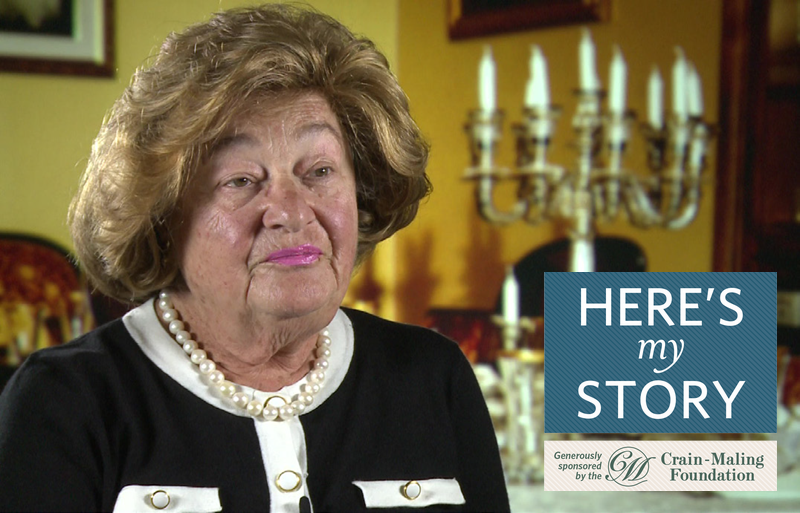
Here’s My Story: I Forgot My Own Name, and Other Adventures
Mrs. Chaya Rivka Mochkin
Click here for a PDF version of this edition of Here’s My Story, or visit the My Encounter Blog.
When I married my husband, Reb Leibel Mochkin, I was living in Paris as a refugee following the Second World War. In 1952, while I was expecting our first child, we emigrated to Montreal, Canada, and almost as soon as we arrived, my husband went to New York to see the Rebbe.
“When you have a son,” the Rebbe told him “you should name him after my father-in-law,” referring to Rabbi Yosef Yitzchak Schneersohn, the Previous Rebbe, who had passed away two years earlier. I gave birth to our daughter Rochel shortly thereafter and two years later we had a son, whom we named Yosef Yitzchak, as the Rebbe had requested.
Although I didn’t look sick after the birth, I lost a lot of blood, and I barely ate anything for the next two months. When I came home from the hospital, with two babies to care for, I felt so weak that I could barely hold a glass of water. A couple of weeks after that, I started to have terrible waves of pain in my back. After being checked out, the doctors established that I had developed gallstones during the pregnancy and I would need surgery to have my gallbladder removed. Being only twenty years old, it was quite rare to need such an operation.
The surgery was scheduled for a Tuesday morning at the Royal Victoria Hospital in Montreal. The next day happened to be the Tenth of Shevat, marking the anniversary of the Previous Rebbe’s passing, and my father-in-law, Reb Peretz Mochkin, traveled from Montreal to attend the special gathering with the Rebbe in New York.
Several hours after my operation, my medical situation turned critical. My liver stopped functioning, my blood pressure dropped, I fell unconscious, and the doctors decided that I needed to have another operation – the second within 24 hours.
“I operate nearly 365 days a year, so I don’t even remember who my patients are,” my surgeon later said, “but I remember that you didn’t let me sleep for three nights.” I had entered a critical condition during that time, and every minute counted.
By then, my father-in-law was in New York, and when he heard about what had happened, he was very distraught. At the farbrengen, he passed the message on to the Rebbe.
“She will be well,” the Rebbe answered. This was more than just a blessing – the Rebbe worded it as a promise.
But seeing that he was still worried, the Rebbe turned to a friend of my father-in-law’s and remarked, “Why is it her fault that he doesn’t trust me?” The Rebbe then took a piece of challah bread from his table and sent it to my father-in-law, to bring back to me, before adding: “Tell Peretz that she will be completely healthy!”
He soon brought the challah back to me in Montreal, and – after two operations and eighteen blood transfusions – I slowly started coming back to myself. It took time but, little by little, I ended up fully recuperating and went on to have five more children, thank G-d.
It was during this episode that I was given an additional name – Chaya, which means “life” – a traditional practice for when someone is in a life-threatening situation. For years, when I met or corresponded with the Rebbe, he would emphasize that I had two names, and if I left out my new name and just wrote “Rivka” on a note to him, he would remind me to include it.
In general, the Rebbe would often inquire after my health when we had a private audience with him. We felt a sense of awe whenever we were in the Rebbe’s presence, but then he would ask about how I was feeling, or my diet, and so on.
One particular example of this happened years later, during a private audience before the Bar Mitzvah of Shimon, my second to youngest child. The Rebbe gave us the customary blessings for a Bar Mitzvah, and then turned to look at me very intensely. “And how are you doing – with your health?”
The truth is that I felt exhausted. I had many children to take care of, and we also always had a lot of guests, so I was overtired and overworked. But the way the Rebbe posed the question took me aback, and I couldn’t respond at first.
“Nu,” the Rebbe said simply. “It should be good – and there is no limit to how good something can be.”
After I came home and told my mother about this exchange, she understood that something was not right, and insisted that I go to the doctor. After performing a physical, the doctor established that my iron levels were sixty percent lower than they should have been, and helped bring me back to proper health.
It was only because the Rebbe had shown such concern that I realized there was an issue that needed to be addressed; otherwise, I probably would have just kept going until I collapsed. But when the Rebbe looked at me, he saw my condition better than I myself did.
This was the closeness and the protection that I felt from the Rebbe. It saved my life, more than once.
The matriarch of a large Chabad family, Mrs. Chaya Rivka Mochkin has resided in Crown Heights since 1956. She was interviewed in April 2013.















